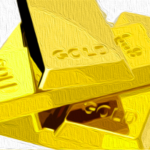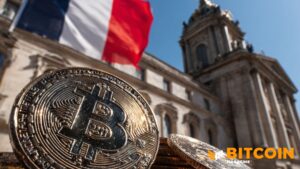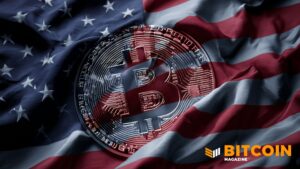Are you ready to dive into the exciting world of cryptocurrency with JPMorgan Chase & Co.? Brace yourself as JPMorgan gears up to revolutionize its trading and wealth-management services by accepting cryptocurrency-linked assets, such as spot Bitcoin exchange-traded funds (ETFs), as loan collateral.
Expanding Financial Horizons
JPMorgan's Crypto Evolution
Picture this: JPMorgan is set to kick off this groundbreaking initiative with BlackRock’s iShares Bitcoin Trust (IBIT), with plans to incorporate more ETFs in the future. This game-changing policy isn't exclusive—it's a global shift that caters to all client segments, from everyday retail accounts to seasoned investors.
Redefining Asset Valuation
Equity Evolution
Here's where things get interesting. JPMorgan is not only embracing crypto assets for loans but is also elevating their status in net worth and asset evaluations. Imagine digital assets now standing shoulder-to-shoulder with traditional investments like stocks, vehicles, or fine art when determining loan eligibility. It's a whole new financial landscape!
Adapting to Change
Regulatory Ripples
The tides are turning in the regulatory realm, too. With the Trump administration's renewed interest in digital assets, the spotlight on spot Bitcoin ETFs has intensified. These ETFs, born in January 2024, have quickly amassed a staggering $128 billion in assets, solidifying their position as one of the most successful ETF ventures to date.
The Ripple Effect
Price Peaks and Partnerships
Not to mention, Bitcoin's value has soared, hitting an all-time high of $111,980 in May 2025. JPMorgan's proactive stance isn't surprising, considering its early foray into blockchain technology and ongoing collaborations with industry giants like Coinbase. This strategic move further cements digital assets in the bank's lending framework.
An Unwavering Stand
Dimon's Dilemma
Despite CEO Jamie Dimon's reservations about Bitcoin, he staunchly defends clients' rights to engage with the cryptocurrency. At the firm's investor day, Dimon made his stance clear, likening his view on Bitcoin to smoking: "I'm not a fan of Bitcoin. I don't think we should smoke, but I defend your right to smoke. I defend your right to buy Bitcoin, go at it."

Exciting times lie ahead as JPMorgan paves the way for a new era of financial inclusivity and innovation. Embrace the opportunity to leverage cryptocurrency assets for traditional loans and witness the evolution of modern banking firsthand!
Frequently Asked Questions
What's the advantage of a Gold IRA?
There are many advantages to a gold IRA. It's an investment vehicle that allows you to diversify your portfolio. You control how much money goes into each account and when it's withdrawn.
You have the option of rolling over funds from other retirement account into a gold IRA. This will allow you to transition easily if it is your decision to retire early.
The best part? You don’t need to have any special skills to invest into gold IRAs. They're available at most banks and brokerage firms. Withdrawals can happen automatically, without any fees or penalties.
However, there are still some drawbacks. Gold has historically been volatile. It's important to understand the reasons you're considering investing in gold. Are you seeking safety or growth? Are you trying to find safety or growth? Only when you are clear about the facts will you be able take an informed decision.
If you want to keep your gold IRA open for life, you might consider purchasing more than one ounce. A single ounce will not be sufficient to meet all your requirements. You could need several ounces depending on what you plan to do with your gold.
If you're planning to sell off your gold, you don't necessarily need a large amount. You can even manage with one ounce. These funds won't allow you to purchase anything else.
How Much of Your IRA Should Include Precious Metals?
You should remember that precious metals are not only for the wealthy. It doesn't matter how rich you are to invest in precious metals. There are many ways that you can make money with gold and silver investments, even if you don't have much money.
You might consider purchasing physical coins, such as bullion bars and rounds. It is possible to also purchase shares in companies that make precious metals. Or, you might want to take advantage of an IRA rollover program offered by your retirement plan provider.
Regardless of your choice, you'll still benefit from owning precious metals. They are not stocks but offer long-term growth.
Their prices are more volatile than traditional investments. If you decide to sell your investment, you will likely make more than with traditional investments.
Who has the gold in a IRA gold?
The IRS considers any individual who holds gold “a form of income” that is subject to taxation.
You must have at least $10,000 in gold and keep it for at most five years to qualify for this tax-free status.
Although gold can help to prevent inflation and price volatility, it's not sensible to have it if it's not going to be used.
If you plan to eventually sell the gold, you'll need a report on its value. This could impact the amount of capital gains taxes your owe if you cash in your investments.
To find out what options you have, consult an accountant or financial planner.
Statistics
- You can only purchase gold bars at least 99.5% purity. (forbes.com)
- Instead, the economy improved, stocks rebounded, and gold plunged, losing 28 percent of its value in 2013. (aarp.org)
- The price of gold jumped 131 percent from late 2007 to September 2011, when it hit a high of $1,921 an ounce, according to the World Gold Council. (aarp.org)
- Indeed, several financial advisers interviewed for this article suggest you invest 5 to 15 percent of your portfolio in gold, just in case. (aarp.org)
- This is a 15% margin that has shown no stable direction of growth but fluctuates seemingly at random. (smartasset.com)
External Links
irs.gov
cftc.gov
finance.yahoo.com
forbes.com
- Gold IRA – Add Sparkle to Your Retirement Nest Egg
- Understanding China's Evergrande Crisis – Forbes Advisor
How To
The History of Gold as an Asset
Gold was a currency from ancient times until the early 20th century. It was widely accepted around the world and enjoyed its purity, divisibility and uniformity. It was also traded internationally due to its high value. Because there were no internationally recognized standards for measuring and weighing gold, the different weights of this metal could be used worldwide. One pound sterling, for example, was equivalent in England to 24 carats, and one livre tournois, in France, to 25 carats. A mark, on the other hand, was equivalent in Germany to 28 carats.
In the 1860s the United States began issuing American currency made up 90% copper (10% zinc) and 0.942 gold (0.942 pure). This resulted in a decline of foreign currency demand and an increase in the price. This was when the United States started minting large quantities of gold coins. The result? Gold prices began to fall. The U.S. government needed to find a solution to their debt because there was too much money in circulation. They decided to return some of the gold they had left to Europe.
Since most European countries were not confident in the U.S. dollar they began accepting gold as payment. However, many European nations stopped using gold to pay after World War I and started using paper currency instead. The value of gold has significantly increased since then. Even though gold's price fluctuates, it is still one of the most secure investments you could make.
—————————————————————————————————————————————————————————————–
By: Jenna Montgomery
Title: Unlock Financing Opportunities: JPMorgan Embraces Bitcoin & Crypto ETFs
Sourced From: bitcoinmagazine.com/news/jpmorgan-to-offer-clients-financing-against-bitcoin-crypto-etfs
Published Date: Wed, 04 Jun 2025 17:41:21 +0000













